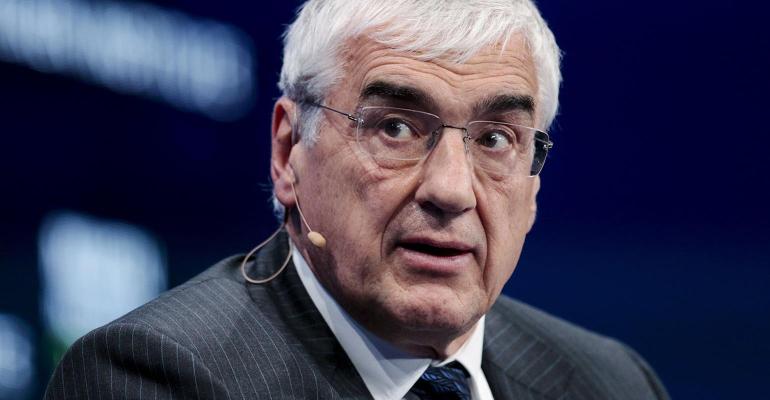(Bloomberg Opinion) -- Is a hedge fund anything without its founder? Another batch of well-known hedge fund managers have sold out or moved to liquidate portfolios this month. Their legacies as entrepreneurs underscore the challenges of building a firm that outgrows the key risk taker.
The first surprise was the purchase of Michael Hintze’s CQS by Canada’s Manulife Financial Corp. Next came famed short-seller Jim Chanos’s decision to return capital after managed assets fell to around $200 million from $8 billion over the last 15 years.
Their achievements are clear. Chanos will always be famed for short-selling Enron prior to the energy trader’s collapse, inspiring a generation of investors and analysts to root out fraud. A painful bet against Tesla Inc. as it soared in value won’t change that.
CQS became one of London’s best-known hedge funds as a credit-focused firm benefiting from clients’ thirst for yield in a zero interest-rate world. That made Hintze’s fortune, and he became a notable donor to the UK’s ruling Conservative party. Born in China and raised in Australia, he would gain the knighthood and peerage that are the ultimate prizes of the British establishment. Losses in Hintze’s own fund during the pandemic tarnished his status as an investor, even if he has performed well since.
But handing over your fund to a successor, or building a business that can attract new assets through its own brand strength, are trickier legacies to secure by some distance.
You can aspire to be Julian Robertson, whose Tiger Management bred the legendary “Tiger Cubs,” a successor generation of hedge fund managers; or target the scale of a Bridgewater Associates LP. Or aim to become a “platform” like the giant multi-manager powerhouse Millennium Management LLC. But these are exceptions.
Small wonder Echo Street Capital Management cited asset management’s poor record in handling succession when it committed to return client funds, Bloomberg News reported, three years after ceasing hedge-fund strategies to focus on long-only investing.
The move by Chanos looks like a straightforward business decision. Plentiful short opportunities persist and the “Golden Age of Fraud” is in full force, he told clients, touting performance beating most hedge fund indices over the last three and five years. But short-focused funds are effectively an insurance product that pays off handsomely in bad markets. And stocks soared after the financial crisis with only occasional wobbles as the drift to passive investing accelerated.
Chanos’s long-run performance hasn’t been so good as to persuade enough investors to maintain defenses against the next hurricane. The decline in managed assets will have cut the fee income to support the trading and compliance expenses that go with running money. His firm is converting to a boutique offering bespoke advice on fundamental short ideas and portfolios — a model with a far lower regulatory costs.
Hintze created a business that was an attractive acquisition target. That’s hard enough. But CQS was arguably running up against the limits of what it could achieve on its own. The buyer isn’t hiring Hintze, who is starting a new firm. What Manulife wants is the CQS brand and the now-diversified credit business, with $14 billion under management and expertise in convertible bonds, regulatory capital and other types of alternative credit.
CQS once aspired to become a global asset manager under its own steam. Hintze hired his one-time colleague from Goldman Sachs Group Inc., Xavier Rolet, to spearhead expansion. There was a brief foray into equities, but the former stock-exchange boss left quickly. Under Chief Executive Officer Soraya Chabarek, formerly an executive at Moore Capital Management, CQS has refocused on its credit roots.
Perhaps it’s not so easy for a London firm to expand distribution outside its backyard unaided. And doubtless the task of building a global client base becomes harder if the founder’s strategy suffers a terrible year. More esoteric credit strategies (like the manufacture of collateralized loan obligations) require equity capital too. All that would have reinforced the logic of folding into a bigger partner.
The blueprint was there among CQS’s UK neighbors. Credit specialist BlueBay Asset Management sold itself to Royal Bank of Canada in 2010. Its name continues as a brand of RBC. The founders later left to set up a new firm that’s sold a minority stake to US-listed Ares Management Corporation. Marshall Wace LLP stands out for growing as an independent force – but it brought in US buyout firm KKR & Co. as a shareholder to help institutionalize the business.
The alternative asset management industry has long grappled with a succession and longevity problem. Reinventing or selling the business at least beats fast-tracking it to a historical entry in Wikipedia.
More From Bloomberg Opinion:
- Druckenmiller Mistakes Treasury for a Hedge Fund: Jonathan Levin
- The ‘Next Warren Buffett’ Curse Isn’t Always Fatal: Justin Fox
- Hedge Funds' Decent Year Is Still Not Good Enough: Mark Gilbert
Want more Bloomberg Opinion? OPIN <GO> . Or you can subscribe to our daily newsletter .
To contact the author of this story:
Chris Hughes at [email protected]





